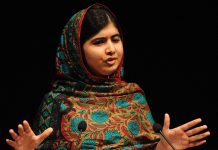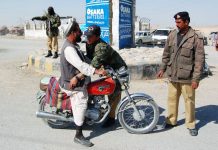Peshawar: Hasnain sees the teacher bringing the handgun to the classroom every day. Sitting in the class, he and other students, quietly observe the teacher as he takes the gun out of his pocket and places it on the table, before starting the day’s lesson.
“Once, the teacher told us if we are not regular in the class or make mistakes, he will shoot us with the gun,” said Husnain, with all the innocence of a 9 year old.
Hasnain is a student of grade 4 in a government primary school in the Mardan district of Khyber Pakhtunkhwa. In his school, the faculty regularly bring handguns to the class after the provincial government allowed teachers and other staff to keep weapons in the wake of December 2014 massacre of 138 school children in Peshawar.
Hasnain and his class fellows feel afraid in the school, especially of teachers with guns, and try to finish their work on time. Though his teacher used the gun to frighten and discipline the children in Hasnain’s class, another teacher at a school in Swat killed a student of class 5 in June 2015. The teacher Majeed Khan was cleaning his gun in the staff room when the he fired the gun accidentally, hitting a student passing through the school’s corridor. The student Maaz died instantly.
However, the victim’s father Sardar Khan told New Lens on phone that his son died because the teacher fired at him deliberately. He appealed to authorities to investigate his son’s “murder” and demanded that the government should ban weapons on school premises of schools as it had an adverse psychological effect of children, making them fearful and anxious.
The Khyber Pakhtunkhwa government allowed teachers to carry guns and provided firearms training to them in January 2015, saying it did not have enough police to protect every school in the province. The move was a part of efforts to beef up security of education institutes after the massacre of children at the Army Public School Peshawar in December 2014, the deadliest terror attack in country’s history. Around seven militants with heavy weapons attacked the school, entering classrooms and killing 150 people, mostly school children.
At the time, public representatives, civil society and teachers objected to the provincial government’s decision to arm and train school staff across the province to protect education institutes saying it wasn’t their job to fight militants. But the provincial government stood by its decision.
“The decision would only promote a culture of arms in our society and negatively impact the younger generation,” said Sardar Hussain Babak, a former education minister and a member of provincial assembly associated with the progressive Awami National Party. ” A teacher’s primary responsibility is to educate pupils, to teach peace and harmony rather than brandishing guns and becoming an inspiration for gun running.”
Babak said that the government should take back the order to create a peaceful environment in schools for students to pursue education. He said after the APS attack, no education institute was safe.”It is the government’s responsibility to provide security and make security arrangements for every school.”
Babak’s concern for the safety of schools is shared by teachers who feel they are not fit for the job of protecting schools, saying teaching and guarding the school premises against terror attacks don’t go together.
Malik Khalid Khan, President of All Primary Teachers Association, rejected the government’s decision to allow weapons on school premises, saying the provision of security to students and teachers was the state’s responsibility.
“Our job is to teach students, not protect them from militants,” Khan told News Lens. He said that the government had banned corporal punishment in schools but allowed teachers to keep weapons in schools. He said it didn’t just amount to jeopardizing the physical safety of children and staff but also caused psychological damage.
“It is illogical to ask teachers to carry weapons in school,” Khan said, adding that the government had spent millions of rupees on discouraging corporal punishment in education institutions. “They should take back the order and completely ban weapons on school premises.”
He also opposed engaging teachers in elections and anti-polio campaigns suggesting that the government make should alternative arrangements because two primary school teachers were killed in election-related violence during the local government elections in Khyber Pakhtunkhwa on May 30.
However, the Khyber Pakhtunkhwa Minister for Elementary and Secondary Education Muhammad Atif Khan told News Lens that his department had never issued instructions to teachers to carry weapons.
“Our government would never encourage teachers or students to take firearms to classrooms,” said Khan.
He regretted the recent incident of shooting of a student at the hands of a teacher saying the incident took place in a private school not public. He said the provincial government had allocated Rs 10 billion for school facilities and directed the Parent Teachers Council that takes care of schools at the union council level to purchase guns for watchman hired for the protection of schools.
“We are totally against the weapon culture in schools and will never allow teachers to carry guns in schools,” said Khan.
The Head of University of Peshawar Psychology Department Dr Erum Irshad said weapons on school premises was a dangerous trend – it not only can harm children at school, but the children then follow their teachers and handle guns at homes that can cause incidental death or injury.
Irshad said that weapons can cause serious physical and structural damage but also long-term psychological harm. “Carrying weapons on school premises is unacceptable and should be forbidden.”
Yousaf Shah, whose three children study at Government Primary School Par Hoti in Mardan district said after the APS incident he worries for his children. He said allowing teachers guns in schools had had a bad impact on children.
“Our children did not know anything about weapons, but now they know their names and calibres,” said Shah. “We send our children school for education, but they learning about weapons.”
Fazal Hanif, a government high school teacher in Peshawar said that carrying weapons in school has become a compulsion. He said after the APS attack teachers were very conscious of the threat and they had acquired licensed pistols.
Hanif said he knew that weapons in school had a bad effect on student and studies, but they were compelled to carry them as schools in Peshawar were not secure and could be targeted anytime like the APS.



